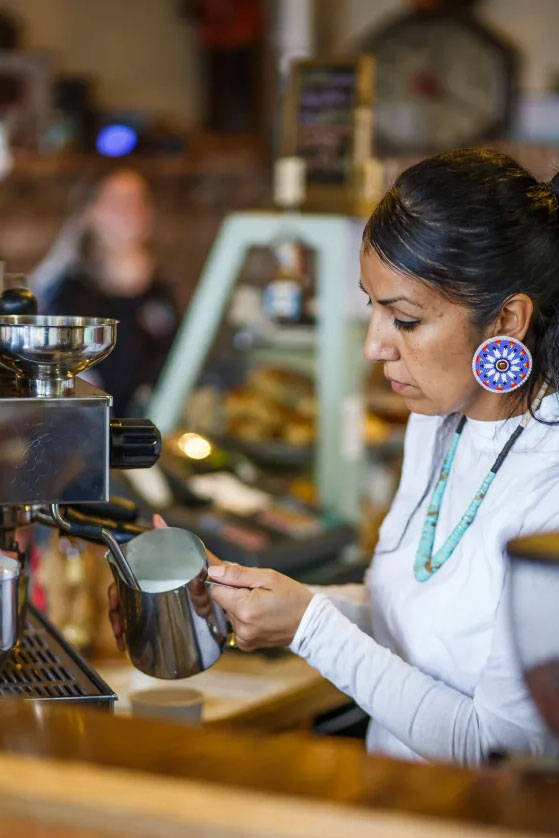A "movement" in the field of coffee, by Native Americans

Πως ένας Βίσωνας αλλάζει τη ζωή δεκάδων Ιθαγενών Αμερικάνων
Beautiful things happen slowly and gradually and change always comes in small steps - and the same goes for the coffee world. Slowly, on the occasion of a small cafe in Oregon, a "movement" is formed in the coffee industry that gives Native Americans the place they deserve, and the place they have not found for years.
 A Bison that carries the tradition of Native Americans
A Bison that carries the tradition of Native Americans
Bison is a small cafe in Portland, Oregon, the ancestral land of the Clackamas Indians, but the majestic animal is not the only connection to the Native Americans, as all the coffee beans in this store come exclusively from small companies, which belong to Indigenous. Bison first opened in 2014, by Loretta Guzman, a member of the Shoshone - Bannock tribe and is currently preparing its first franchise.
Ms. Guzman's company not only explores the tastes and tastes of Native Americans - most prefer dark roasting, she notes - but also aspires to act as a network that will create jobs and grow local communities economically, including Unemployment rates are alarmingly high.
The story of the company's founding has its own significance: in 2008, Guzman was seriously ill when she saw in her dream a bison wandering outside her paternal home. Her grandfather, interpreting the dream according to the traditions of their tribe, assured her that her cure was not far off. When she was cured, and the idea came to her to deal with coffee, she remembered the dream of the bison, which led her to design the first company to have coffee exclusively from roasteries owned by Native Americans.
Many of these companies operate synergistically, having close ties with respective cooperatives of indigenous producers in Latin America, which ensures fair pay and high quality coffee. Today, such roasteries are constantly opening, having good relations with each other, exchanging know-how and forming something that could be characterized as a "movement": an indigenous movement.
Coffee & Indigenous: a very old story
Although coffee is not introduced in the "New World" until recent years, the whole ritual and habit of a stimulant drink is really a very old affair for the natives of North America. In what is now the South of the United States, the Indians cultivated and marketed Yaupon Holly, a tea-extracted herb that is high in caffeine, has a stimulant effect and is also shared among relatives, friends and more generally in the community in a way reminiscent of today's coffee culture. Today, Yaupon is about to disappear, but coffee has taken its place, both gastronomically and culturally. From the very first years of its introduction to the American continent, coffee was one of the few products that the usually suspicious Native Americans immediately adopted, without calling them "white things", of the conqueror.
Although coffee does not thrive in North America, there are several roasteries and small coffee companies owned by Native Americans, in places with strong communities such as Nevada and Arizona, or in cities - cultural crucibles such as New York. Most Native American roasts use coffee beans from Central and South America, which should not be taken for granted, as it indicates the taste buds of the indigenous communities and shows a form of solidarity between the indigenous communities. from the manufacturing and post-processing north to the rural and productive south.
Loretta Gruzman invests a lot in its producers, demanding better and better blends, different degrees of roasting and, finally, better coffee. "I want to push them to become better. They are the people, in the end. "Whatever race they are, for me they are my people", he confesses disarmingly.
based on an atlas obscura story







